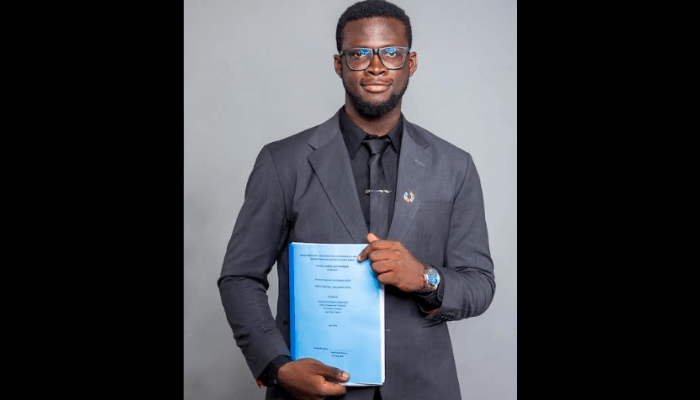Samuel Oyefusi is a final-year Mechanical Engineering student at Pan-Atlantic University (PAU), whose innovative project aligns with the growing need for affordable automation in Nigeria’s healthcare and public service sectors.
Oyefusi’s project titled, “Development of a Cost-Effective Autonomous UVC Disinfection and Vacuum Cleaning Mobile Robot”, was inspired by the high number of cleaning staff globally and in Africa who were exposed to harmful viruses and bacteria during the COVID-19 pandemic.

“In Nigeria, where industrial robots are rare and unaffordable for many institutions, this project aims to bridge that gap by offering a practical, locally built alternative.
“Reducing human exposure to infection can lower the cost of illness and medical complications from workplace-acquired infections,” he said, stressing the innovation offers a broader economic and social impact.
Besides, the robotics enthusiast explained that he has a strong sense of purpose and a burning desire to solve real problems in Africa using technology.
“During the COVID-19 pandemic, I was deeply moved by the stories of frontline cleaning workers. Many of them lost their lives while working in high-risk, high-traffic environments like hospitals and airports.
“I started asking myself a question that changed everything:
What if robots could help reduce the spread of infectious diseases and protect those who clean our public spaces daily? It was a bold idea, especially in a country like Nigeria, where robotics components are expensive, access to tools is limited, and local expertise in autonomous robots is still growing,” he noted.
According to Oyefusi, his robotics invention, disinfect high-traffic areas using UVC light with over 95 percent effectiveness, and vacuums dust and particles with a current efficiency of 40 percent.
There are plans to improve performance in future versions, and it can be deployed in environments such as hospitals, schools, offices, and airports, where the risk of healthcare-associated infections (HAIs) is particularly high.
To recruiters and companies, he said, “If you’re looking to bring real value to your team through robotics, automation, or innovative product development, let’s work together to build solutions that matter.”
He aspires to inspire young Nigerian engineers and innovators to build practical, high-impact technologies with local relevance; promote the adoption of robotics and automation in Nigeria’s public health sector.
Besides, he is working towards supporting job creation through local manufacturing and technical support services for robotics.
On how he came up with the idea, he further said, “I dove into open-source robotics simulation tools like ROS2 and began learning how to implement Simultaneous Localisation and Mapping (SLAM), autonomous navigation, and UVC disinfection techniques.
“Every step came with its challenges; there were nights I stayed up debugging code, figuring out hardware limitations, or adjusting the robot’s mobility and sensing. I didn’t always have answers, but I had a goal. I kept reminding myself, “Samuel, do it afraid. With God, all things are possible.”
This robot is built with real-world use in mind, for spaces like schools, hospitals, offices, and airports. It navigates autonomously and is designed to minimise human exposure to viruses, bacteria, and harmful particles in indoor environments.
As Oyefusi celebrates the successful defence of his project, he acknowledges the support of individuals such as Darlington Agholor, his academic supervisor and industry advisor; Lawrence Ukpoju; Samuel Obiagba; Evan Sabvure; and Iman Tokosi; among others for their support during the simulation phase.
His message to every young African student, especially those passionate about robotics, clean tech, or solving problems through innovation, is simple: start small, stay consistent, and do it afraid.
“You may not have all the tools, but you have your mind, your passion, and your purpose. That’s enough to begin,” he said.
Credit Business Day


